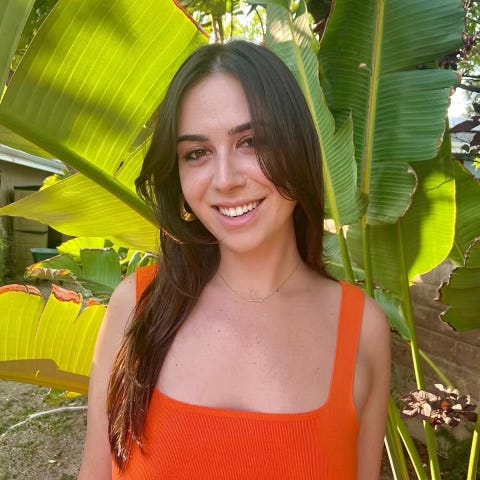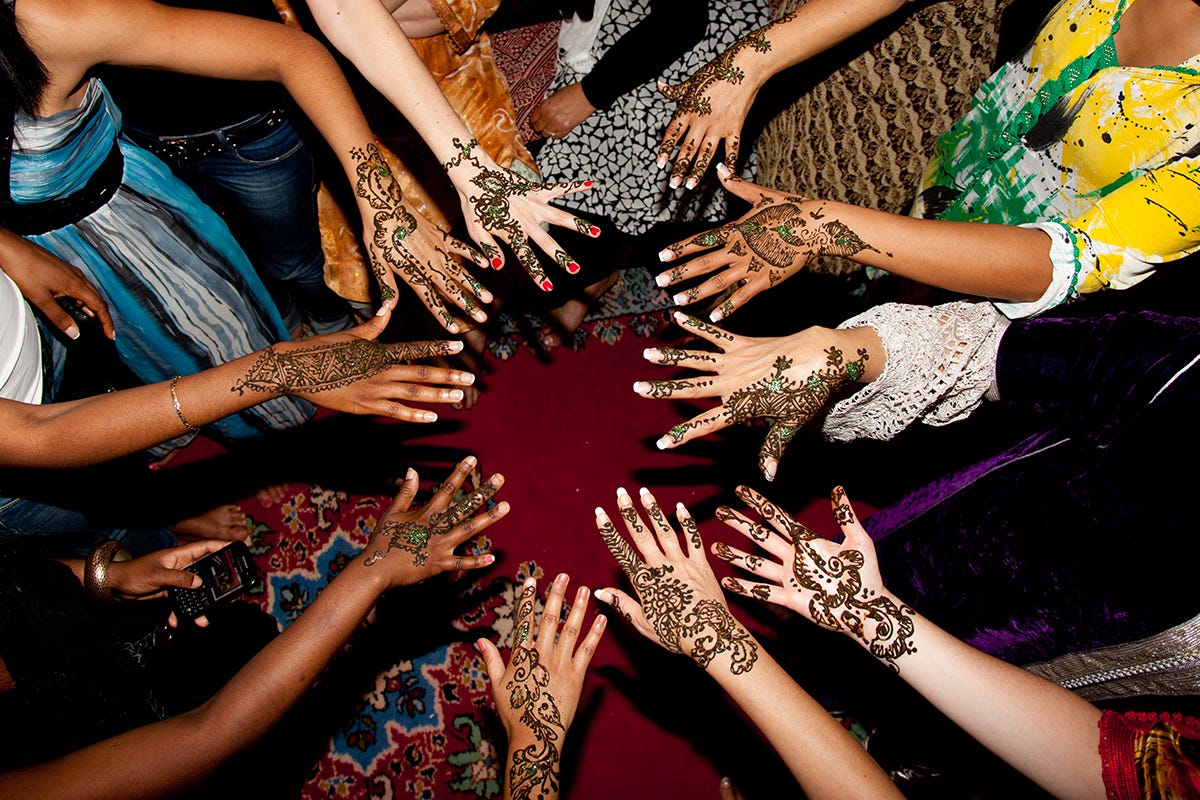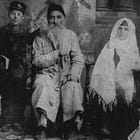Mimouna, Moufletta, and Misconceptions
Warning: This interview will make you hungry.
Happy Mizrahi Heritage month from THAT Jewish blogger who, on the first Friday of November, posted about the Ashkenazi tradition of cemetery measuring. Oops.
Don’t cancel me yet, because I reached out to my friend Leigh, who I met on our JDC Entwine trip to Estonia, to interview her about her Sephardic heritage.
Sephardic I say? Yes. You see, I incorrectly assumed she’s Mizrahi because her family is from a North African country. But Leigh put me in my place, and by that I mean she kindly explained it’s possible her ancestors were expelled from Spain during the Inquisition, so she identifies as Sephardic.
Mizrahi, Sephardic… hey, as long as I highlight something not Ashkenazi in this interview, I’m satisfied. There’s so many beautiful types of Judaism to celebrate. Enjoy, and I hope you learn something like I did. Don’t miss the Mizrahi playlist after the interview! 🎵
What’s your family’s background and history?
I was born here in Los Angeles to two Israeli parents, so I’ve always had dual citizenship with Israel. My family in Israel is Moroccan—my mom was born in Casablanca and she lived there until she was about five when she, her parents, and her younger brother moved to Tel Aviv. So the rest of my family was born in Israel but still strongly identifies as Moroccan Israeli. There’s a very strong ethnic subculture in Israel of the Moroccan Israelis. That’s something my family has always carried with them their whole lives.
It’s interesting because my entire family has married non-Moroccans (my mom is the oldest of seven siblings), but if you ask any of them or their children what they are, they’ll unanimously say Moroccan even though they married Turkish, Yemenite, Polish. Everyone says they’re Moroccan. That gene is quite strong in our family.
Why did your mom’s family leave Morocco? What it unsafe for Jews?
When my grandparents were alive we used to ask them this question. They said there was a time when it was actually really great to be a Jew in Morocco under the king. But things came out afterwards from other members of my family when it seemed like Jews were starting to get pushed out. My family eventually split into thirds: one third went straight to Canada, another third went to France, and another third went to Israel.
When my grandmother was older and struggling with dementia, she would have these flashbacks of being under attack and it sounded like she was scared of people knocking on the door or scared of someone coming to get her because she was Jewish. She never talked about this when she was alive. She didn’t say she ever experienced any of that in Morocco, but it sounded like there was some underlying trauma.
How do you balance your Moroccan heritage with your Israeli identity?
Growing up, I would spend every single summer going to Israel. My sister and I were raised as dual US-Israeli citizens with Hebrew as our first language. Being Israeli was the number one thing about our identity. When people ask if we’re Jewish, I say, “I’m Israeli.” That’s the type of Jew that I am. It’s not like reform or conservative, even though in theory I am a reform Jew. I’m just…Israeli.
I always assumed that everyone in Israel had the same type of identity as I did and used the same type of slang words. It wasn’t until I was an adult living there in grad school that I realized my grandparents had a very thick Moroccan accent that was different from the way other people’s grandparents spoke Hebrew, and that a lot of the phrases that I would casually toss around were Moroccan street slang.
When I was older, I also realized the differences in immigration between Ashkenazi and Sephardic immigrants. When my mom’s family moved to Israel, they were put in a south Tel Aviv neighborhood along with other North Africans and Persians. The whole neighborhood was full of Sephardic and Mizrahi immigrants. Hearing the stories from my mom about the neighborhood, its classism, and how they were treated, I don’t think it’s something I fully understood until I was older.
What’s your take on Ashkenormativity?
I think it’s a particularly American Jewish experience. I went to Jewish day school here in LA from preschool up until college, so I was always surrounded by a lot of Persians and Israelis. But a lot of people go to Jewish summer camp, which tend to be more Ashkenormative. There’s a lot of Ashkenazi takes on prayers, for example. It wasn’t until I went to USC that I met non-Jews who would be like, “I love Jews, there’s a deli by my house with good bagels.” But I don’t think I set foot into a deli until I dated an Ashkenazi guy. I love bagels, but lox is not something I’ve ever eaten or wanted to eat because it’s not something I grew up with. When my mom moved to the US, she learned how to make matzo ball soup because it was something kids talked about at school. My grandpa was like, “Why would you do that? We have our own food and culture.” It was a joke but also kind of real. She had gone her whole life without eating matzo ball soup.
My biggest qualm is probably the cultural perception to non-Jews. We should celebrate all the different traditions, especially here in the US, where we have such a massive population of Ashkenazi Jews who came in waves before and after the Holocaust. But the more recent waves in the last few decades have been Jews from other countries like Iran and Israel. I feel that’s not being accurately represented especially well in film or TV. I think when people think of Jewish TV, they think of shows like The Marvelous Mrs. Maisel, which I love so much, but I would also love it if they thought of Fauda. A show that did it well was Wet Hot American Summer, when they had the Israeli camp counselor character. The mannerisms were spot on and it was hysterical.
I wish people who weren’t Jewish knew about Jewish culture that wasn’t just Ashkenazi, because I feel that feeds into the perception that all Jews come from Europe. I’m always astonished when I tell people I’m a Moroccan Jew, and they’re like, “What do you mean? You’re Jewish but Moroccan but also Israeli?” People can’t comprehend there were Jews in these countries for a long time. That’s really my passion project, showing people that other types of Judaism exist and can be celebrated as well.
“I wish people who weren’t Jewish knew about Jewish culture that wasn’t just Ashkenazi, because I feel that feeds into the perception that all Jews come from Europe.”
What are some traditions in your family that you’re proud of?
Some of my favorite ones have to do with festive occasions, like the henna parties before a wedding. It’s really beautiful and is my favorite wedding tradition. The bride and the groom wear traditional outfits. As a child, my sister and I would get dressed up for family weddings in these elaborate, gold-woven kaftans. It’s a gorgeous way to celebrate the wedding before the wedding, and I think the henna parties can sometimes be more fun than the wedding itself. They’re loose, loud, and fun.
The food in our tradition is unparalleled—they train us to eat spicy peppers since we’re two years old. Food plays a role in the festivities. There’s the Mimouna, the breaking of the Passover fast. That’s another tradition that has endured. My grandma would prep a week in advance and make these elaborate pastel sugar cookies shaped into little fruits out of marzipan. The traditional thing to have is a moufletta, a thin, sweet filled with honey or jam, and you roll them in stacks. My family has a moufletta-making party anywhere in the world, whether we’re on vacation or separated, we all send pictures making them together.
There’s also sfinge, Moroccan doughnuts, which are more for Chanukah but we’ll sometimes make them for the Passover festivities. They’re puffy, light, and golden doughnuts that you can fill with jelly. It’s a lot of fried foods! We also dress up for Mimouna and it feels celebratory. The fact that these traditions have endured history and movement, whether it’s to France, or Israel, or the US, is special.
Is there anything else you want readers to know?
There’s something that separates you culturally in a way that people don’t necessarily understand. Culturally, there’s something beautiful about meeting another Moroccan or another North African Jew. There’s a sense of familiarity in the way that they might describe their Tunisian or Yemenite grandma. They could be describing my Moroccan grandma, in the mannerisms and the way they describe their childhood—it probably sounds just what it was like to live and survive in a predominantly Muslim country. They have a real lasting impact on their descendants today in a way that you wouldn’t think about too often.
Got any fun Shabbat plans this week?
I joined a Jewish Federation networking group called the Community Leadership Institute that meets monthly. It’s been a beautiful community for me since the war. It’s a cohort of Jewish individuals between the ages of 30-40 who are looking to advance their own careers, and who find community and comfort through the group. It’s not on Shabbat this week, but feels like Shabbat for me.
Shabbat Shalom! May you experience a culture different from your own,
P.S. Hillel made a bangin’ playlist for Mizrahi Heritage Month. Check it out here:






you write and we learn. thank you
Loved reading about Leigh’s cultural background & upbringing. It felt like I was reading about my own cultural upbringing - so many similarities to the Iranian culture. We also have elaborate henna parties before weddings. My generation also grew up with the trauma of our ancestors living as Jews in a predominantly Muslim country. Thank you for this Shabbat drop, one of my favorites!